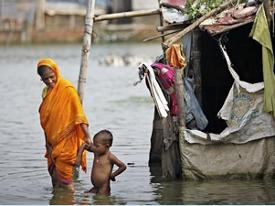

ABC: What women want (and it's not shoes)
ABC invited Green Cross Australia's CEO Mara Bun to write an opinion piece about woman and climate change.
"What women want (and its not shoes)"
Climate change is sexist. Women are affected disproportionately more so than men. But women also have the skills to bring the world to order, says Mara Bun.
Women's desires can be deliciously whimsical. Ask three different women what they want and you'll get answers ranging from a boss who lets her juggle work and life because they know she will deliver; a hairdresser who knows exactly when to stop cutting; and clothes that make even her not-so-hidden bulges look glam.
But a warming planet is focusing the aspirations of women worldwide. Forget whimsy: what women really want - as the dire predictions that scientists have been making for decades now materialise live on our TV screens - is a future that our kids can look forward to, and a chance to influence the planet our kids will inherit.
According to the World Bank, if temperatures rise by five degrees (the likely result of not making a hard turn at Copenhagen), then three billion more people will suffer water stress, corals would have mostly died off, some 50% of species worldwide would eventually become extinct. Sea levels would rise by several metres and malnutrition and disease will spread across the world as crops fail.
Not a great world for little ones to grow up in. Especially if they are girls who live in the developing world.
Some 85% of the people who die in climate-induced natural disasters are women and girls and 75% of environmental refugees are women. For cultural and religious reasons many girls are not taught to climb trees or to swim. Women are less mobile during environmental disasters because they are primary care givers. During the 1991 cyclone and floods in Bangladesh, the death rate for women was almost five times higher than men.
Women make up two-thirds of world's poor. In Southeast Asia, women provide up to 90% of labour for rice cultivation yet women farmers have little access to new drought resistant varieties and cultivation practices. In Kenya, fetching water may use up to 85% of a woman's daily energy intake; in times of drought some women spend up to eight hours a day in search of water. Just 16% of rural households in Namibia have access to electricity - and as wood that provides household energy needs has become scarcer, each collection trip done by women and children now averages 15 kilometres.
Not just the poor
Climate impacts on women are disproportionate in wealthy nations as
well. During the 2003 heat wave in Europe, women accounted for 60%
of the 15,500 deaths in France. Forty-seven cases of sexual assault
were reported in the US in the aftermath of Hurricanes Katrina and
Rita. In the UK, 19.2% of single pensioner households and 16.8% of
lone parent households are facing 'energy poverty', the inability
to pay the electricity bills for food and heating. The majority of
these are women. In Australia where the majority of single
aged-pensioners are women, higher carbon costs will hurt fragile
pocket books hard without guaranteed compensation.
Though women are victims of climate change they are also powerful agents of change. A Honduran community suffered no deaths after Hurricane Mitch largely because of the extensive involvement of women in education and response programs. Here in Australia the Climate Coolers community group are inspiring one million women to cut one million tonnes of CO2. Oxfam's "Sisters on the Planet" promote women, in both rich and poor countries, who are determined to do whatever they can to put a stop to climate change.
So without arguing about how we got into this pickle, let's celebrate how women can help solve the climate crisis, just as we mourn its growing impact on women and girls.
Bearing in mind the challenges that lie ahead for all of us, ask yourself this question: Given that corporate and government leadership is largely a male thing, would it make a difference if women were in the driving seats of our parliaments and boardrooms at this very delicate stage of human development? Could women's leadership shift the focus onto basic human security, and help extend our investment horizons to match the aspirations we all have for our children?
Copyright © Green Cross Australia | Terms & Conditions | Privacy Policy
web design brisbane :: (zero)seven


